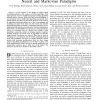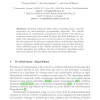1728 search results - page 26 / 346 » Self-Organisation: Paradigms and Applications |
JFLP
2002
13 years 8 months ago
2002
We present a practical partial evaluation scheme for multi-paradigm declarative languages combining features from functional, logic, and concurrent programming. In contrast to pre...
AMAI
1999
Springer
13 years 8 months ago
1999
Springer
Logic programming with the stable model semantics is put forward as a novel constraint programming paradigm. This paradigm is interesting because it bring advantages of logic prog...
CODES
2009
IEEE
14 years 3 months ago
2009
IEEE
A growing number of applications, with diverse requirements, are integrated on the same System on Chip (SoC) in the form of hardware and software Intellectual Property (IP). The d...
TSMC
1998
13 years 8 months ago
1998
— A new tendency in the design of modern signal processing methods is the creation of hybrid algorithms. This paper gives an overview of different signal processing algorithms si...
UPP
2004
Springer
14 years 2 months ago
2004
Springer
Evolving solutions rather than computing them certainly represents an unconventional programming approach. The general methodology of evolutionary computation has already been know...


